
The Château de Chenonceau is a French château spanning the river Cher, near the small village of Chenonceaux, Indre-et-Loire, Centre-Val de Loire. It is one of the best-known châteaux of the Loire Valley.
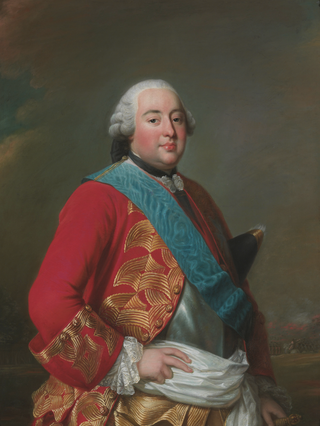
Louis Philippe I, Duke of Orléans, known as le Gros, was a French royal of a cadet branch of the House of Bourbon. The First Prince of the Blood after 1752, he was the most senior male at the French court after the immediate royal family. He was the father of Philippe Égalité. He greatly augmented the already huge wealth of the House of Orléans.

MonsieurPhilippe I, Duke of Orléans was the younger son of King Louis XIII of France and Anne of Austria, and the younger brother of King Louis XIV. He was the founder of the House of Orléans, a cadet branch of the ruling House of Bourbon.
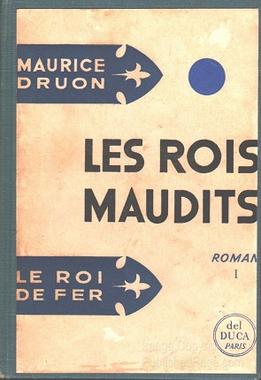
The Accursed Kings is a series of seven historical novels by French author Maurice Druon about the French monarchy in the 14th century. Published between 1955 and 1977, the series has been adapted as a miniseries twice for television in France.

The 4th House of Orléans, sometimes called the House of Bourbon-Orléans to distinguish it, is the fourth holder of a surname previously used by several branches of the Royal House of France, all descended in the legitimate male line from the dynasty's founder, Hugh Capet. The house was founded by Philippe I, Duke of Orléans, younger son of Louis XIII and younger brother of Louis XIV, the "Sun King".

Louis Jean Marie de Bourbon was the son of Louis Alexandre de Bourbon and his wife Marie Victoire de Noailles. He was therefore a grandson of Louis XIV of France and his mistress, Madame de Montespan. From birth he was known as the Duke of Penthièvre. He also possessed the following titles: Prince of Lamballe ; Prince of Carignano; Duke of Rambouillet; Duke of Aumale (1775); Duke of Gisors; Duke of Châteauvillain; Duke of Arc-en-Barrois; Duke of Amboise; Count of Eu; Count of Guingamp. He was the father in law of Philippe Égalité.
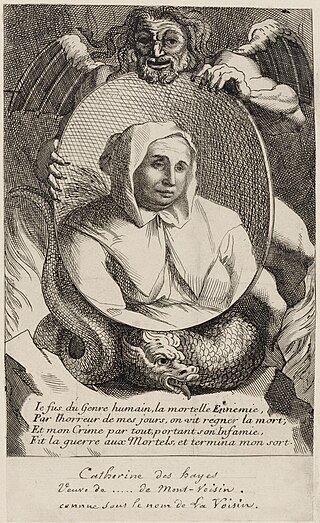
The Affair of the Poisons was a major murder scandal in France during the reign of King Louis XIV. Between 1677 and 1682, a number of prominent members of the aristocracy were implicated and sentenced on charges of poisoning and witchcraft. The scandal reached into the inner circle of the king. It led to the execution of 36 people.
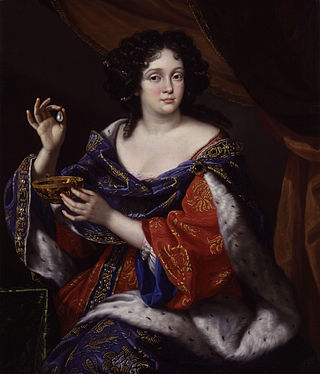
Marie Anne Mancini, Duchess of Bouillon, was an Italian-French aristocrat and cultural patron, the youngest of the five famous Mancini sisters, who along with two of their female Martinozzi cousins, were known at the court of Louis XIV, King of France as the Mazarinettes, because their uncle was the king's chief minister, Cardinal Mazarin. She is known for her involvement in the famous Affair of the Poisons, and as the patron of La Fontaine.

Jean, Count of Paris is the current head of the House of Orléans. Jean is the senior male descendant by primogeniture in the male-line of Louis-Philippe I, King of the French, and thus, according to the Orléanists, the legitimate claimant to the defunct throne of France as Jean IV. Of France's three monarchist movements, Orléanism, Legitimism and Bonapartism, most royalists are Orléanists. Jean is the second son of the late Henri, Count of Paris (1933–2019) and his former wife Duchess Marie-Thérèse of Württemberg. With the death of his father, he has been using the style of Count of Paris since 2019.

Louis-Auguste de Bourbon, duc du Maine was an illegitimate son of Louis XIV and his official mistress, Madame de Montespan. The king's favourite son, he was the founder of the semi-royal House of Bourbon-Maine named after his title and his surname.

Louise Henriette de Bourbon, Mademoiselle de Conti at birth, was a French princess, who, by marriage, became Duchess of Chartres (1743–1752), then Duchess of Orléans (1752–1759) upon the death of her father-in-law. On 4 February 1752, her husband became the head of the House of Orléans, and the First Prince of the Blood, the most important personage after the immediate members of the royal family.

The Burning Court (1937) is a famous locked room mystery by John Dickson Carr. However, it contains neither Gideon Fell nor Henry Merrivale, Carr's two major detectives. It was published in the United States, and was highly controversial upon its first printing, due to its unorthodox ending. Today, it is hailed as Carr's best non-series novel.

Angélique, Marquise des Anges is a 1964 historical romance film directed by Bernard Borderie and starring Michèle Mercier, Robert Hossein and Jean Rochefort. It is based on the 1956 novel of the same name by Anne and Serge Golon. It was made as a co-production between France, Italy and West Germany

Marie de Bourbon was the wife of Thomas Francis, Prince of Carignano, and thus a princess of Savoy by marriage. At the death of her brother in 1641, she became Countess of Soissons in her own right, passing the title down three generations of the House of Savoy.

Philippe of Lorraine, known as the Chevalier de Lorraine, was a French nobleman, descendant of the Dukes of Elbeuf, member of the House of Guise, cadet branch of the House of Lorraine. He was the renowned lover of Philippe I, Duke of Orléans, brother of Louis XIV.

Louise Henriette Françoise de Lorraine was a French noblewoman and member of the House of Guise, a cadet branch of the House of Lorraine. She was the last wife of Emmanuel Théodose de La Tour d'Auvergne (1668–1730).
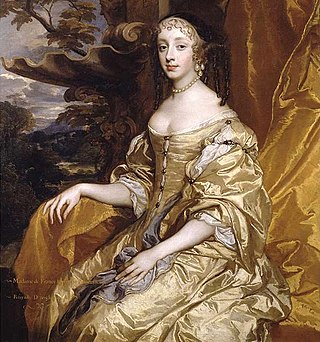
Henrietta of England was the youngest daughter of King Charles I of England and Queen Henrietta Maria. She was Duchess of Orléans through her marriage to Philippe I, Duke of Orléans.

Marie Louise Angélique Aimée Caroillon des Tillières, was a wealthy French heiress who kept a salon during the July Monarchy.

The Château de Cirey is a château in Cirey-sur-Blaise, Haute-Marne, France. The château was the home of Émilie du Châtelet and her lover Voltaire from 1734 to 1749.
La Faille or The Wall is a French Canadian television crime drama series of three seasons, with a total of 25 episodes, which started broadcasting on Club Illico in 2019. The series is written by Frédéric Ouellet, directed by Patrice Sauvé and Daniel Roby, and produced by Dominique Veillet for Pixcom/Quebecor Content. The first season of eight episodes was broadcast in Canada from December 12, 2019 and in France as The Wall: Cover Your Tracks from April 26, 2020 via 13ème Rue. The second season, La Faille 2 or The Wall: The Chateau Murder, of nine episodes was broadcast from October 17, 2021. La Faille 3: La Verger or The Wall: The Orchard, the third and final season of eight episodes, was aired on November 16, 2022.



















